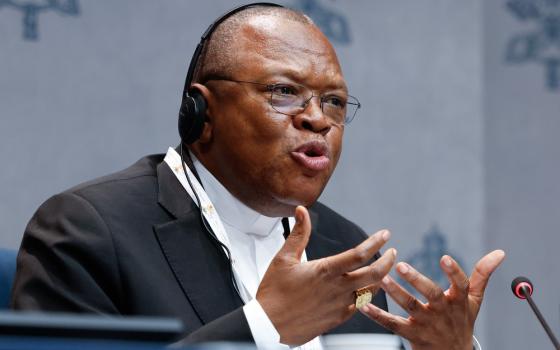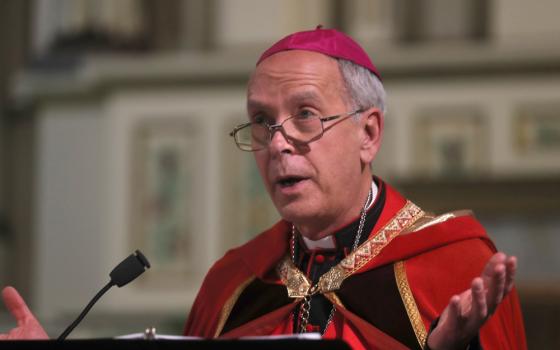St. Phoebe of Cenchreae is depicted in an icon by Eka Fragiadaki of the Angelicon workshop in Crete, Greece. (Angelicon/Eka Fragiadaki)
As a young girl growing up in Haiti, I remember feeling like I lived in a paradise as I rested easy in my mother's lap. She and our community made me feel safe, loved and seen. It was not hard for me to come to know God as a loving mother who cares for all his children. I sensed that God knew me and called me by name to go out and proclaim his word.
By the age of 8, I was serving as a lector in our parish, and by the age of 18 was leading retreats for the Legion of Mary and speaking to groups of all ages. I felt welcomed to share who I was and bring forth my gifts.
I had a vision of Jesus when I was about 15 years old, seeing him as a handsome Black man who patiently asked me the same question he had asked Peter in John's Gospel: "Do you love me?" (John 21:15-17). I sensed then that Jesus was asking for my whole life.
It has not been a straightforward path. I came of age in the 1990s, when the clearest way for a woman to live a deeper call and commitment to the church was through religious life. I spent years discerning becoming a nun — first volunteering with a community of sisters, then entering as a novice.
The regular prayer, sisterhood and studies was enlivening. But I struggled, especially when service to the church too closely looked like servanthood. There were real constraints that limited how we could develop our gifts and capacities as women.
I sensed Jesus was calling me to leave and struggled to make that decision. For the next three years, I wandered in a spiritual desert, experiencing a long dark night of the soul.
Others looked on and made judgments about why I left religious life — I must want a husband or a family, they assumed — but that was not where I felt called. I felt misunderstood, constantly swimming against the current.
Why are we afraid of this dream of women received as deacons? Women like me are already doing such work — just without the title.
But the biblical deacon Phoebe inspired and comforted me. St Paul describes her like this:
I commend to you Phoebe our sister, diakonos of the church of Cenchreae, so that you will receive her in the Lord in a manner worthy of the holy ones, and assist her in whatever way she may ask you, because she has been a benefactor of many and of me, too [Romans 16:1-2].
Phoebe's feast day is Sept. 3, and I have long found a devotion and sense of connection to this ancient woman of the early Christian church.
These days, our church is seeking to find a way to more fully receive the baptismal dignity of all men and women. In some places, there is hesitation to seek the intercession of St. Phoebe, a hesitance to recognize her as a deacon. We know that the deacons of today are not the same as the deacons of the first centuries. But why are we afraid of this dream of women received as deacons? Women like me are already doing such work — just without the title.
During my dark night of the soul after leaving the novitiate, brothers from the Taizé community visited us in Haiti and invited me to spend time with them as a permanent member in France, where I was encouraged to share my own experiences of the church and life in Haiti to audiences great and small.
Something was rekindled as I experienced joy in serving God and being in a community that lived such a wide view of the Gospel. I experienced a renewed desire to serve, and Taizé helped me reclaim a vocation as a laywoman in the church.
I felt sent forth — ready to be received where Jesus sent me.
Upon returning to Haiti, I led work to transform an abandoned mission parish in Luly into a vibrant Catholic community, where I could put all I had into preaching and teaching. And yet the path of welcome was tinged with persecution.
Haitian political leaders threatened me because I lived the preferential option for the poor. Members of the clergy plotted to kick me out as soon as I'd established a congregation.
After spending 10 years pastoring the church of Luly, and with the blessing of our late Archbishop Joseph Serge Miot of Port-au-Prince, I felt the missionary spirit drive me to a new land: the cold northern climate of Boston, Massachusetts.
Advertisement
In Boston, I accompanied Haitians at Immaculate Conception in Everett, and the community grew exponentially. We created a place of home and belonging for the Haitian community as we lived in what could be a strange and hostile place.
Here, I have been received and welcomed to sharpen my ministerial practice as a board-certified chaplain, pastoral associate and spiritual director. To further deepen my intellectual hunger, I was encouraged to complete a doctorate in ministry, which I did.
Today, I see how Jesus has been close, serving me in my path and calling me into service that does not deny who I am, but enlarges it. I am able to do more than I could have imagined on my own by bringing forth the fullness of the gifts God has planted in me.
I visit families in their homes; offer bereavement and spiritual counseling and faith-sharing; I hear confessions on deathbeds without offering the ritual of absolution; I preside at funerals and wakes. I celebrate with people the joys and miracles of life.
I continue to actively welcome my Haitian brothers and sisters, many who come to Boston as refugees and seek out the church as a place of welcome and support. I help meet needs for housing, food, health and legal services — and I sit at the kitchen table, weeping as they share the harrowing journey they make, recalling the violence they have fled.
We each need a Paul in our life, commending us to be welcomed and received in new and strange places. We need those who will send us forth, giving us the authority to preach and minister in the name of Jesus' church.
My own prayer is that our church would be as courageous as Paul and Phoebe, trusting each other, walking in a dangerous world to bring forth the promise of good news, accompanying each other in the wake of our encounters with the risen Jesus who calls us to love him and tend his sheep. Let us welcome women, called deacons, as holy ones, co-equal in ministry to our brothers and as eager and ready to offer our gifts for the sake of the Gospel.
St. Phoebe, deacon, pray for us.






